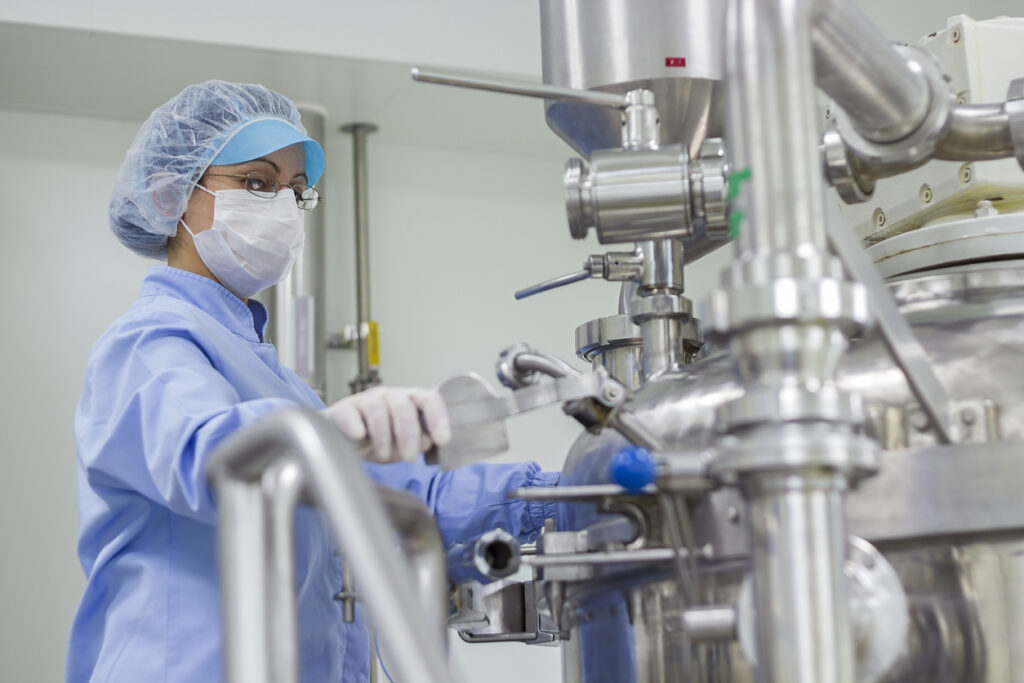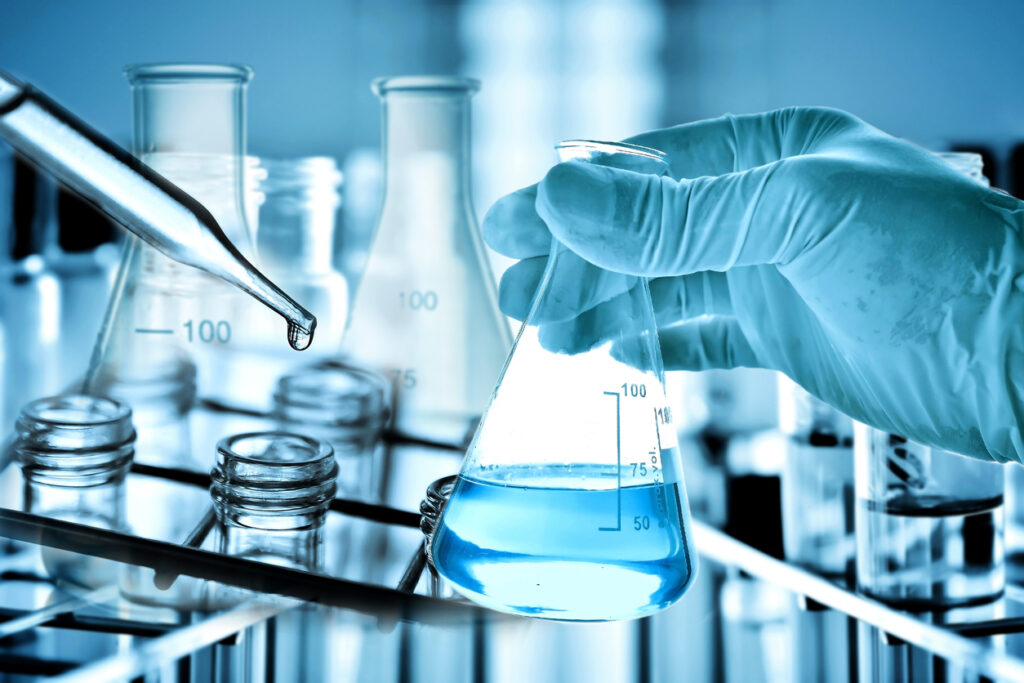From the oil and gas industry to pharmaceuticals, the unsung heroes often reside in the smallest of compounds – production chemicals. Their intricate roles and importance can’t be overstated.
At Applied Catalysts, we’ve been at the forefront of this chemical manufacturing, striving to optimize processes for unparalleled results.
What are Production Chemicals?

Production chemicals are specialized chemicals used in production processes to enhance performance, safety, efficiency, and quality. These compounds have diverse roles:
- Demulsifiers: Separate oil and water, aiding in purer extraction.
- Corrosion inhibitors: Protect equipment from the relentless wear of corrosive substances.
- Scale inhibitors: Prevent mineral deposits that can hamper machinery.
- Biocides: Control microbial activity, ensuring product purity.
- H2S and CO2 scavengers: Remove harmful gases from processes.
- Pour point depressants: Aid in the flow of crude oil, especially in colder conditions.
- Surfactants: These compounds lower surface tension between two liquids or a liquid and a solid. They’re crucial in everything from laundry detergents to enhancing the recovery of oil in petroleum industries.
- Polymers: In wastewater treatment plants, polymers are used as flocculants to help settle out suspended solids, thus clarifying the water.
- pH Adjusters: Used across many industries, these chemicals help maintain the required pH level of a process, ensuring reactions occur at the desired rate and yield.
- Catalysts: Common in the petrochemical, pharmaceutical, and food industries, catalysts speed up chemical reactions without being consumed in the process.
- Antifoaming Agents: In industries where foam can interfere with the process, these agents break down or prevent foam formation, enhancing the efficiency of operations.
- Stabilizers: In polymer industries, stabilizers prevent the degradation of products when exposed to external factors like UV radiation.
- Lubricants: Apart from their traditional use in machines, specific production chemicals serve as lubricants in industries such as food processing to ensure the smooth flow of viscous liquids.
- Heat Transfer Fluids: Used in industries requiring controlled heating and cooling, these chemicals help transfer heat efficiently.
- Solvents: Solvents play a vital role in industries like paints, pharmaceuticals, and cosmetics. They help dissolve other substances, making them integral to the formulation of numerous products.
- Viscosity Modifiers: In industries that deal with fluids, such as paint or oil, these chemicals alter the viscosity to suit the application.
- Thickeners: Widely used in the food and cosmetics industries, thickeners give products their desired consistency.
- Dispersants: In paint and coatings, dispersants help in distributing particles evenly, ensuring a uniform application and finish.
- Antioxidants: These are used primarily in the food industry and in plastics manufacturing. In foods, they prevent oxidation and prolong shelf life, while in plastics, they prevent degradation due to oxidative processes.
- Flame Retardants: In the textile and electronics industries, these chemicals inhibit or delay the spread of fire.
The Role of Production Chemicals in Process Optimizations

In industrial operations, optimizing processes can mean the difference between profit and loss, smooth operations and bottlenecks, and sustainable practices and environmental harm.
Production chemicals stand at the nexus of this optimization, ensuring the delicate balance between these contrasting outcomes.
Let’s delve deeper into their profound impact.
Enhances Productivity
One of the primary goals of any industrial process is to achieve the highest output with the least input. This means maximizing the product yield and ensuring quality and consistency.
Production chemicals, such as catalysts, accelerants, and stabilizers, play a pivotal role. They fine-tune reactions, expedite processes, and stabilize outputs, ensuring that industries can produce more in less time without compromising quality.
Protecting Equipment
The wear and tear on industrial machinery is immense. Corrosion, scale formation, and microbial contamination can lead to equipment failure, resulting in costly downtimes and even costlier replacements.
Enter production chemicals like corrosion inhibitors, scale inhibitors, and biocides.
They act as a protective shield, extending equipment lifespan, reducing maintenance costs, and ensuring operations run smoothly and efficiently.
Environmental Benefits
Beyond optimizing processes for industrial benefit, industries bear an overarching responsibility to the environment. Production chemicals help in this regard in multiple ways.
They can reduce the release of harmful by-products, minimize waste, and even transform waste into valuable products.
For instance, certain chemicals can capture and convert CO2 emissions, turning greenhouse gas into useful compounds.
Others ensure that wastewater is treated effectively, safeguarding aquatic ecosystems.
Safety & Compliance
As industries are regulated by stringent safety and environmental standards, adhering to them becomes paramount.
Production chemicals aid in compliance by neutralizing harmful compounds, reducing flammable or explosive by-products, and ensuring that the end products are safe for consumers and the environment.
Cost Efficiency
Process optimization isn’t just about enhancing production rates or ensuring safety; it’s also about bottom lines.
By optimizing reactions, reducing waste, and prolonging equipment life, production chemicals can lead to substantial cost savings.
Efficient processes require less energy, fewer raw materials, and reduced waste disposal costs, all contributing to a more profitable operation.
Best Practices for Selecting & Using Production Chemicals

Our years of experience have helped us define and refine best practices when it comes to selecting and employing these crucial agents.
Here’s an in-depth look into these practices and why they’re pivotal.
Thorough Research & Compatibility Testing
Before introducing any new chemical into a process, its compatibility with existing components and materials should be assessed.
At Applied Catalysts, we emphasize rigorous laboratory testing to foresee potential reactions, ensuring seamless integration. Any adverse interactions could not only hamper the efficiency of the process but might also pose significant safety risks.
Understanding Process Nuances
Every industry and its specific process has unique requirements. One-size-fits-all is a myth in the world of production chemicals. By deeply understanding the intricacies and nuances of a process, we can select the ideal chemicals that will complement and enhance the operations.
Continuous Monitoring & Adjusting
A static approach to production chemicals can lead to stagnation. It’s essential to have real-time monitoring mechanisms in place. Such oversight ensures timely detection of changes, allowing for adjustments in dosage or even a switch in the chemical agent if needed.
Prioritize Sustainability
With the evolving global emphasis on sustainable practices, selecting chemicals that have minimal environmental impact is crucial. We at Applied Catalysts are committed to greening the chemical landscape, emphasizing production chemicals that are not only effective but also environmentally benign.
Tips for Selecting a Production Chemicals Provider

Choosing the right production chemicals provider is much like committing to a long-term partnership. The right choice can streamline your operations, enhance productivity, and ensure the safety and sustainability of your processes.
Here’s a comprehensive guide to help select the right provider of production chemicals services.
- Expertise & Experience: The foundation of a reputable provider lies in its years of experience and domain expertise. Look for providers who have a rich history and have served diverse industries. Their accumulated knowledge will ensure that they can handle unique challenges adeptly.
- Quality Assurance: Verify the provider’s commitment to quality. This can be reflected in certifications like ISO standards or other industry-specific endorsements. It’s paramount that they adhere to stringent quality control processes to ensure the consistency and efficacy of their chemicals.
- Customization Capabilities: Every industry and operation has unique needs. The best providers don’t just offer off-the-shelf solutions but are willing to customize chemical products to fit specific requirements.
- Safety Protocols: Production chemicals can pose risks if not handled correctly. Ensure that the provider follows robust safety protocols, offers detailed handling guidelines, and prioritizes the safety of both personnel and the environment.
- Sustainability Focus: In today’s era, it’s not just about efficiency but also about sustainability. Check if the provider has a clear environmental policy, emphasizing green production processes and eco-friendly products.
- Transparent Pricing: A good provider will be transparent about their pricing structures, ensuring there are no hidden charges. While cost shouldn’t be the only determining factor, understanding the value proposition is essential.
- Support & Service: Post-sales support, regular training sessions, and consultation services underscore a provider’s commitment to its clientele. Ensure they offer comprehensive support, be it in the form of troubleshooting, regular maintenance, or educational initiatives.
- Research & Development: The realm of production chemicals is ever-evolving. Providers with a strong R&D wing are more likely to offer innovative solutions, staying ahead of industry trends and needs.
- Client Testimonials & Case Studies: One of the most reliable indicators of a provider’s capabilities is the feedback from its existing clients. Look for testimonials, case studies, and reviews to gauge the real-world performance and reputation of the provider.
- Global Reach & Local Support: If you have operations spanning multiple countries or regions, it’s beneficial to opt for providers with a global presence. However, ensure they also offer localized support to address specific regional needs and challenges.
- Regulatory Compliance: The provider should be well-versed with regional and international regulations, ensuring that their chemicals and services comply with all mandatory standards.

Choose a Reliable Production Chemical Provider
Catalysts are the unsung heroes behind many of the advancements in modern industrial processes. They not only accelerate reactions, saving time and energy, but also ensure that reactions proceed in a direction that maximizes product quality and yield.
As the demand for faster, cleaner, and more efficient processes grows, the importance of a reliable Catalst Manufacturer is more important than ever. Get in touch with our sales team today and unlock the full potential of your production processes.
Recent Posts
Regenerative Thermal Oxidizer (RTO) to RCO Conversion
Regenerative thermal oxidizers (RTOs) are a leading solution for controlling volatile organic compounds (VOCs) and hazardous air pollutants (HAPs) from industrial air pollution sources. These systems can achieve up to…
Read MoreCutting Costs and Emissions: A Dual Approach for Spark Ignition Engine Manufacturers
Balancing emission reduction with cost management is crucial in spark ignition engine manufacturing. As global environmental regulations become increasingly stringent, manufacturers are compelled to adopt innovative solutions that meet air…
Read MoreCatalyst Testing Tips: Determining Activity in VOC Catalysts
VOC catalysts are pivotal in reducing harmful emissions released during industrial processes, directly influencing air quality and compliance with stringent environmental regulations. However, the effectiveness of these catalysts hinges not…
Read More

